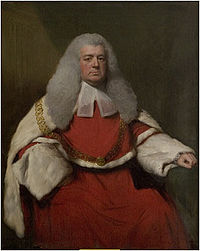
James Eyre
Encyclopedia

England
England is a country that is part of the United Kingdom. It shares land borders with Scotland to the north and Wales to the west; the Irish Sea is to the north west, the Celtic Sea to the south west, with the North Sea to the east and the English Channel to the south separating it from continental...
judge
Judge
A judge is a person who presides over court proceedings, either alone or as part of a panel of judges. The powers, functions, method of appointment, discipline, and training of judges vary widely across different jurisdictions. The judge is supposed to conduct the trial impartially and in an open...
, the son of the Rev. Thomas Eyre, of Wells
Wells
Wells is a cathedral city and civil parish in the Mendip district of Somerset, England, on the southern edge of the Mendip Hills. Although the population recorded in the 2001 census is 10,406, it has had city status since 1205...
, Somerset
Somerset
The ceremonial and non-metropolitan county of Somerset in South West England borders Bristol and Gloucestershire to the north, Wiltshire to the east, Dorset to the south-east, and Devon to the south-west. It is partly bounded to the north and west by the Bristol Channel and the estuary of the...
.
Biography
He was educated at Winchester CollegeWinchester College
Winchester College is an independent school for boys in the British public school tradition, situated in Winchester, Hampshire, the former capital of England. It has existed in its present location for over 600 years and claims the longest unbroken history of any school in England...
and at St John's College, Oxford
St John's College, Oxford
__FORCETOC__St John's College is a constituent college of the University of Oxford, one of the larger Oxford colleges with approximately 390 undergraduates, 200 postgraduates and over 100 academic staff. It was founded by Sir Thomas White, a merchant, in 1555, whose heart is buried in the chapel of...
, which he left without taking a degree. He was called to the bar at Gray's Inn
Gray's Inn
The Honourable Society of Gray's Inn, commonly known as Gray's Inn, is one of the four Inns of Court in London. To be called to the Bar and practise as a barrister in England and Wales, an individual must belong to one of these Inns...
in 1755, Thomas Parker
Thomas Parker (judge)
Thomas Parker was an English judge, Privy Counsellor and Lord Chief Baron of the Exchequer.-References:*Dictionary of National Biography, Parker, Sir Thomas , judge, by J. A. Hamilton. Published 1895....
, chief baron of the exchequer. He commenced practice in the lord mayors and sheriffs courts, paying £63 (2011: £) for one of the four counsel to the City of London Corporation.
He was appointed Recorder of London in 1763 and knighted in 1770.
He was counsel for the plaintiff in the case of Wilkes v. Wood, and made a brilliant speech in condemnation of the execution of general search warrant
Search warrant
A search warrant is a court order issued by a Magistrate, judge or Supreme Court Official that authorizes law enforcement officers to conduct a search of a person or location for evidence of a crime and to confiscate evidence if it is found....
s. His refusal to voice the remonstrances of the corporation against the exclusion of Wilkes
John Wilkes
John Wilkes was an English radical, journalist and politician.He was first elected Member of Parliament in 1757. In the Middlesex election dispute, he fought for the right of voters—rather than the House of Commons—to determine their representatives...
from Parliament
Parliament of Great Britain
The Parliament of Great Britain was formed in 1707 following the ratification of the Acts of Union by both the Parliament of England and Parliament of Scotland...
earned him the recognition of the ministry, and he was appointed a judge of the exchequer in 1772. From June 1792 to January 1793 he was Chief Commissioner of the Great Seal. In 1793 he was made Chief Justice of the Common Pleas
Chief Justice of the Common Pleas
The Court of Common Pleas, also known as the Common Bench or Common Place, was the second highest common law court in the English legal system until 1880, when it was dissolved. As such, the Chief Justice of the Common Pleas was one of the highest judicial officials in England, behind only the Lord...
, and presided over the trials of Horne Tooke
John Horne Tooke
John Horne Tooke was an English politician and philologist.-Early life and work:He was born in Newport Street, Long Acre, Westminster, the third son of John Horne, a poulterer in Newport Market. As a youth at Eton College, Tooke described his father to friends as a "turkey merchant"...
, Thomas Crosfield and Others, with great ability and impartiality.
He was elected a Fellow of the Royal Society in May 1791.
He died in 1799 and was buried at Ruscombe
Ruscombe
Ruscombe is a small village and civil parish, east of Twyford in the Borough of Wokingham, in the English county of Berkshire.Its most notable residents are William Penn, the founder of Pennsylvania, who lived there from 1710 to 1718, and the actor Dennis Price, co-star of Kind Hearts and Coronets,...
in Berkshire
Berkshire
Berkshire is a historic county in the South of England. It is also often referred to as the Royal County of Berkshire because of the presence of the royal residence of Windsor Castle in the county; this usage, which dates to the 19th century at least, was recognised by the Queen in 1957, and...
.
External links
- Wilkes v. Wood, 19 Howell's State Trials 1153 (C.P. 1763)

